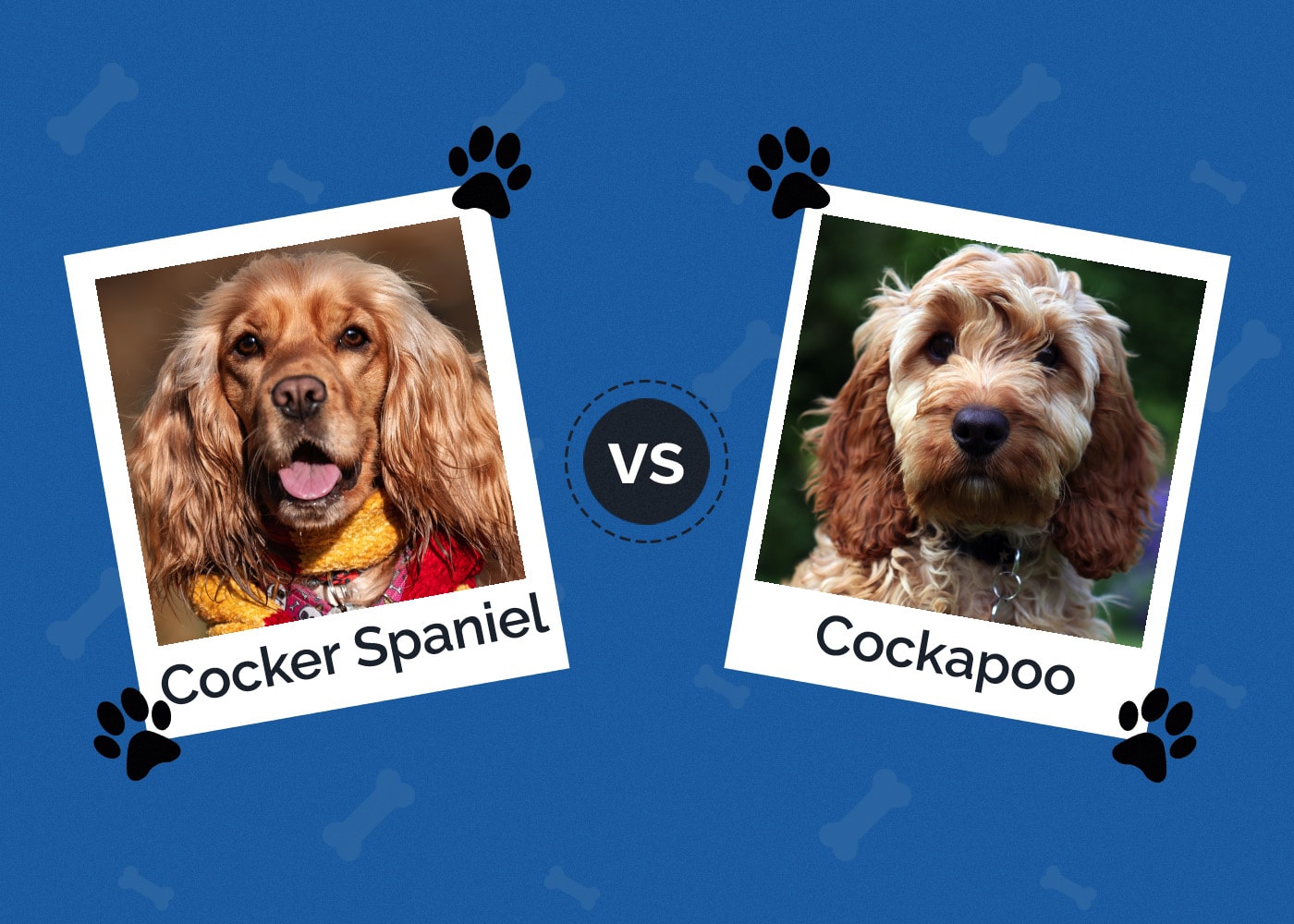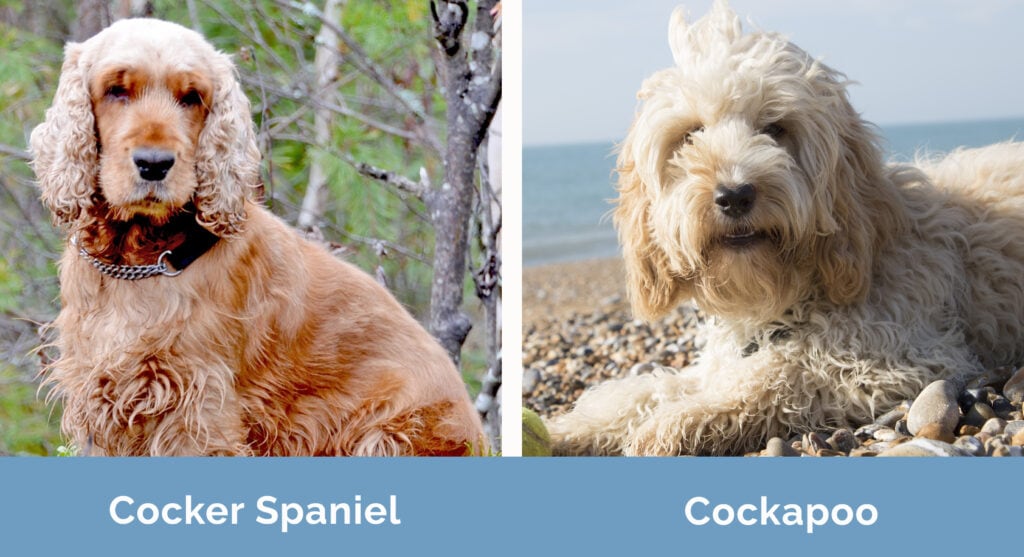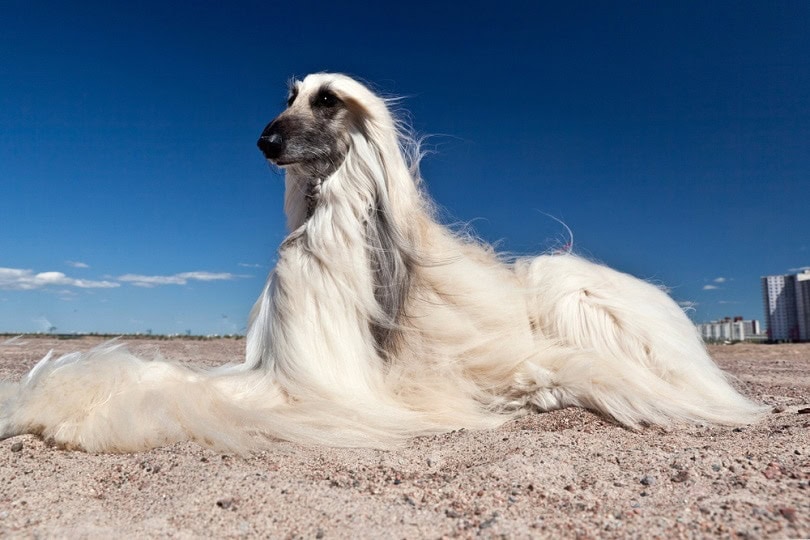Cocker Spaniel vs Cockapoo: How Are They Different? (With Pictures)
By Jessica Kim
Updated on

The Cocker Spaniel and the Cockapoo are both very sweet and affectionate dogs. They’re excellent breeds for first-time dog owners to consider. While the Cocker Spaniel is a purebred dog, the Cockapoo is a hybrid that’s a mix between a Cocker Spaniel and a Poodle. Because the Cockapoo is a mixed breed, its size and personality may vary more than the Cocker Spaniel. As pure breeds, you can expect to find more consistency in size and temperament for Cocker Spaniels.
While a dog’s breed can give you more insight into its temperament, it doesn’t guarantee that your dog will only display the characteristics that are hallmarks of its breed. With that being said, doing thorough research on different dog breeds can still be helpful because it can provide a better prediction of the kind of dog that will best match your lifestyle and fit in with your family. So, keep reading to determine if the Cocker Spaniel or the Cockapoo are good fits for you.
Visual Differences

At a Glance
- Average height (adult): 14–16 inches
- Average weight (adult): 24–30 pounds
- Lifespan: 12–15 years
- Exercise: 1+ hours a day
- Grooming needs: Extensive
- Family-friendly: Yes
- Other pet-friendly: Sometimes
- Trainability: Intelligent, eager to please
- Average height (adult): 10–25 inches
- Average weight (adult): 6–25 pounds
- Lifespan: 12–15 years
- Exercise: 1+ hours a day
- Grooming needs: Extensive
- Family-friendly: Yes
- Other pet-friendly: Often
- Trainability: Intelligent, eager to please
 Cocker Spaniel Overview
Cocker Spaniel Overview
Personality / Character

Cocker Spaniels are very family-oriented dogs. While they may be in the sporting group, they’re still quite affectionate and love being around their favorite people. Cocker Spaniels tend to form strong bonds with one or two people. While they’re not aggressive or particularly wary of strangers, they can be a little shyer or act aloof around them. It may take them some time to relax and reveal their true, sweet personalities to new people.
Cocker Spaniels were originally bred to be hunting dogs. So, many of them have strong prey drives. They may be a little more difficult to leash train, and you’ll definitely want to make sure that they’re in a securely fenced area if they’re running around off-leash.
Because of their strong prey drive, Cocker Spaniels may not ever learn to be fully trusted around smaller pets, especially when left unsupervised. They can be sociable with other dogs and are typically patient with children, especially with children in their own families.
Early socialization will increase the success of dogs being able to coexist with each other and learn how to interact with children. Children must also be taught to interact with Cocker Spaniels appropriately. Cocker Spaniels have beautiful long ears, and it’s important that children do not tug on their ears, as this can be very painful for them.
Exercise
Cocker Spaniels are fairly energetic and love to play. They’ll do well with at least an hour of exercise a day. These dogs will enjoy going on brisk morning walks. Cocker Spaniels that are a little more sociable can also find plenty of entertainment and exercise at dog parks.
Despite their elegant appearance, Cocker Spaniels can be great companions for outdoor excursions. They’ll enjoy going on hikes, camping, and just being outside exploring the neighborhood with you. These dogs are also able to adjust well to apartment living as long as they’re getting enough exercise and opportunities to let loose and run around.
Training
In general, Cocker Spaniels are easy to train because they’re eager to please. These dogs are intelligent and enjoy engaging in mentally stimulating activities. They’re very sensitive, so it’s important to make training sessions short and fun and provide a lot of praise and encouragement. They’re particularly sensitive to the tone of voice and do not handle harshness well at all. So, it’s important not to target your frustrations toward a Cocker Spaniel. It’s better to pause training and take a break if you find yourself feeling impatient.
Cocker Spaniels are athletic dogs that were bred to hunt. So, they’re often excellent participants in different kinds of canine sports, such as agility and obedience competitions, tracking, and hunting tests.
Health & Care
Cocker spaniels are fairly healthy dogs. However, as purebred dogs, they’re predisposed to certain hereditary conditions. Cocker Spaniels are susceptible to allergies, including food allergies and inhalant allergies. As they grow older, they can start to develop eye problems, hypothyroidism, and hip dysplasia.
Cocker Spaniels have particularly extensive grooming needs. They need to be brushed daily to maintain their luxurious coats, and it’s important to always comb through their long ears to ensure that they’re free of any mats and tangles. Cocker Spaniels shed moderately, and regular brushing can help reduce shedding around the house.
Many Cocker Spaniel owners will resort to scheduling professional grooming appointments every 6 to 8 weeks. Requiring shorter cuts can help make brushing their coats easier. It’s also important to regularly check a Cocker Spaniel’s ears and clean them with an ear cleanser. Since their ears are so long, they can easily trap moisture, which can lead to bacterial infections.

Suitable for:
Since Cocker Spaniels don’t do well being alone for long hours, they do best with owners who are able to stay at home with them or take them from place to place so that they’re not left home alone. Cocker Spaniels can do well with families with young children. They’re also good dogs for first-time dog owners, and people who live in apartments.
While they can learn to live harmoniously with other dogs, Cocker Spaniels usually prefer being the only pet in the house. There’s also a good chance that they won’t adjust well to living with cats and small pets.
Cockapoo
Personality / Character

The Cockapoo is a friendly and sociable dog. Due to having Poodle parents, they tend to be more comfortable in crowds and are excited to meet new people. They’re not known to be shy around strangers and love being the center of attention.
Cockapoos are also pretty friendly with other dogs and usually adjust well to living with another dog companion in the home. With proper socialization, they can learn to also coexist with cats and other small pets. Just keep in mind that if your Cockapoo adopts more of the temperament of a Cocker Spaniel, it may not do well with small pets.
This breed was bred to be a companion dog, so it doesn’t do well in situations where it has to be alone for long hours. Cockapoos thrive on human companionship, and many often become successful therapy dogs because of their affectionate personalities, unintimidating appearance, and extremely soft and fluffy coats.
Keep in mind that the size of Cockapoos can vary, and there’s no guarantee that they will be a certain size and weight. Most Cockapoos have either a Toy or Miniature Poodle parent, but breeders can also breed Standard Poodles with Cocker Spaniels. The average weight of a Cockapoo ranges from 15-20 pounds.
Exercise
Cockapoos are energetic dogs that require at least an hour of exercise per day. They can get this exercise by going on walks around the neighborhood, visiting the dog park, or just running around in the backyard. Cockapoos can be fairly athletic and intelligent and can be excellent candidates for agility courses.
Since Cockapoos often inherit the intelligence of a Poodle, they’ll also need plenty of opportunities for mental exercise. These dogs will enjoy learning how to solve dog treat puzzles and play with other kinds of enrichment toys that engage their brain.
Bored Cockapoos can easily start to engage in destructive behaviors. They can start to get into trouble in the home by getting into hard-to-reach places and destroying your furniture and personal belongings. So, make sure to provide plenty of mentally stimulating activities for your Cockapoo every day.
Training
Fortunately, Cockapoos are very eager to please. These intelligent dogs are relatively easy to train, and they often enjoy learning new things. So, once you establish the basics of obedience training, they can learn new commands pretty quickly. Cockapoos are also very likely to enjoy learning new tricks and may pick up trick learning as a hobby. Because Cockapoos tend to be pretty food-motivated and love attention, they become fast learners if they receive a lot of praise and rewards.
Like Cocker Spaniels, Cockapoos are also very sensitive to people’s tone of voice and do not respond well to harsh training. So, make sure to keep training fun and positive. It’s also important to keep in mind that smaller Cockapoos may be a little more challenging to potty train because of their smaller bladders. Owners must be extra attentive to their bathroom habits and ensure that they’re giving plenty of opportunities for their Cockapoos to go potty.

Health & Care
Cockapoos are generally a healthy breed and can live relatively long lives. Some common ailments that a Cockapoo can have are allergies and ear infections. Like Cocker Spaniels, Cockapoos have long and floppy ears, so it’s important to clean them out and check up on them regularly to avoid ear infections. As Cockapoos age, some may start to experience joint pain and develop hip dysplasia or patellar luxation.
These dogs also have pretty extensive grooming needs. They tend to shed less than Cocker Spaniels, but they need to be brushed daily to ensure that dead and loose hairs don’t remain trapped in their coats. Cockapoos also have curly hair, which gets tangled and matted very easily. If you’re unable to invest the time to maintain a longer coat, you can always ask your groomer to give your dog a shorter cut.
It’s also important to remember that no dog is 100% hypoallergenic. This is because dog allergies are caused by a specific type of protein found in dog hair, saliva, and urine. Having a dog that sheds less can help reduce the spread of these proteins, but people can still have allergic reactions to low-shedding dogs.
Suitable for:
Cockapoos are wonderful family dogs, and they can live well in both apartments and single-family homes. These dogs are also great pets for anyone that likes to host many guests because they won’t mind the foot traffic and will probably enjoy receiving attention from all kinds of people. Cockapoos are also good playmates for young children, as long as the children are taught to interact with dogs appropriately. Similar to Cocker Spaniels, Cockapoos don’t do well being left home alone for long hours.
Which Breed Is Right for You?
Overall, the Cocker Spaniel and Cockapoo share several characteristics and qualities. Both are family-oriented dogs that don’t do well being alone for a long time. They’re also great dogs for first-time dog owners because they’re intelligent and eager to please.
One difference between the Cocker Spaniel and Cockapoo is that the Cocker Spaniel can act a little shy towards strangers and other dogs, while Cockapoos tend to have more extroverted personalities and enjoy being around all kinds of people and making new friends.
So, if you also have an extroverted personality and enjoy having people over at your house, a Cockapoo may be a better fit for your lifestyle. If you’re more introverted and prefer to do things on your own, the Cocker Spaniel may be the better companion for you.
See Also:
- Springer Spaniel vs Cocker Spaniel: The Key Differences (With Pictures)
- Cockapoo vs. Mini Goldendoodle: The Differences (With Pictures)
Featured Image Credit: (L) Kristina Chizhmar, Shutterstock | (R) Lee Ph, Shutterstock













